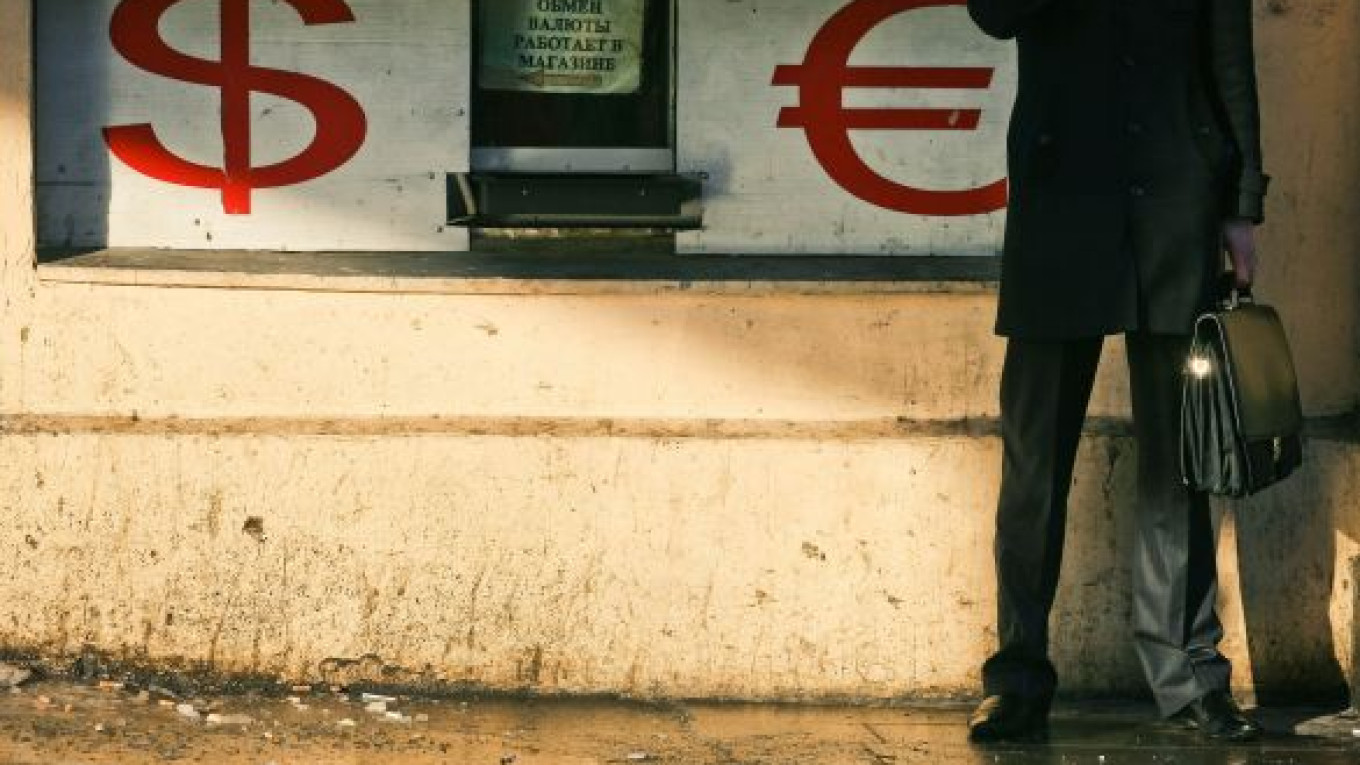The dollar’s ascent against the euro may be stifling Russian efforts to challenge the greenback’s dominance as a reserve currency, with policy makers in Moscow allowing the dollar’s share of foreign reserves to swell.
The Central Bank “changed the currency structure of reserves,” raising the U.S. currency’s share by 3 percentage points to 44.5 percent, BNP Paribas said May 18, citing Central Bank numbers on the final months of last year. The euro’s portion fell 3.7 points to 43.8 percent. The figures, part of the Central Bank’s annual report to parliament, aren’t official yet, said a Central Bank spokesman who declined to be identified, citing bank policy.
It’s “very much a case of economic rationalism trumping bellicose politics,” said Neil Shearing, an emerging markets economist at Capital Economics. “With the euro likely to fall further over the coming quarters and a general retreat to safe havens likely to boost the dollar, expect more of the same.”
The euro has dropped 18 percent against the dollar since Nov. 25 on investor concern that policymakers may fail to contain Europe’s debt crisis. Central Banks have probably lost $300 billion this year on the euro and may consider cutting holdings of the currency, Stephen Jen, a managing director at hedge fund BlueGold Capital Management, said May 6.
The dollar’s share in Russian reserves will probably account for “50 percent, maybe more” of the total by the end of this year, said Yulia Tseplyayeva, head of research at BNP Paribas.
“We must be prepared for changes to the allocation of various currencies on the market because the global situation isn’t very stable,” Economic Development Minister Elvira Nabiullina said Thursday. The Central Bank has a “sensible currency diversification,” she said. “I don’t think substantial changes need to be made here.”
Russian policymakers have been devising alternatives since the credit crisis erupted that would allow the world’s biggest energy supplier to reduce its reliance on the dollar. Officials in Moscow have been backed by BRIC peers seeking to limit the dollar’s dominance in the $8.36 trillion of global reserves.
India said in July that the world economy was too reliant on the dollar. China and Brazil in April last year joined Russia in discussing the creation of a new supranational currency. ?
President Dmitry Medvedev has pushed for the creation of regional reserve currencies and in July produced a prototype coin for a “world currency,” which he said was needed to stabilize the global economy.? “Common sense tells you that Russia’s rhetoric doesn’t always correspond to reality,” said Nikolai Kashcheyev, head of research at Sberbank's treasury department. “What we are seeing now is the Central Bank trying to balance reserves after skewing them toward euros.”
A euro decline to $1.22 would wipe out gains from reserve managers’ efforts to diversify away from the dollar into the European currency, Jen wrote in a May 6 report. China may have lost $80 billion and Russia $14 billion, according to that note. The euro traded as low as $1.21 on Wednesday.
Arkady Dvorkovich, an adviser to Medvedev, said May 12 that it would be “absolutely incorrect” to assume that the Central Bank had suffered losses on the scale suggested by Jen and said returns must be calculated over a longer time frame. ?
Dvorkovich told reporters Thursday that the euro area economy may stagnate for months or even years. Growth will be “very slow or even zero,” he said. “It will be a very difficult time.”
Russia’s foreign reserves reached $458.2 billion in the week ended May 14. The stockpile peaked at $598.1 billion in August 2008 before the Central Bank was forced to spend a third of the holdings to manage what it called a “gradual” ruble devaluation against the dollar sparked by a 54 percent slump in Urals crude in 2008.
“The euro’s depreciation will be the Central Bank’s best argument for increasing the dollar’s share in reserves,” Tseplyayeva said. “Because of the restrictions on the quality of the assets into which the Central Bank can invest, the Central Bank will tend to focus on dollar assets in the near future.”
A Message from The Moscow Times:
Dear readers,
We are facing unprecedented challenges. Russia's Prosecutor General's Office has designated The Moscow Times as an "undesirable" organization, criminalizing our work and putting our staff at risk of prosecution. This follows our earlier unjust labeling as a "foreign agent."
These actions are direct attempts to silence independent journalism in Russia. The authorities claim our work "discredits the decisions of the Russian leadership." We see things differently: we strive to provide accurate, unbiased reporting on Russia.
We, the journalists of The Moscow Times, refuse to be silenced. But to continue our work, we need your help.
Your support, no matter how small, makes a world of difference. If you can, please support us monthly starting from just $2. It's quick to set up, and every contribution makes a significant impact.
By supporting The Moscow Times, you're defending open, independent journalism in the face of repression. Thank you for standing with us.
Remind me later.


